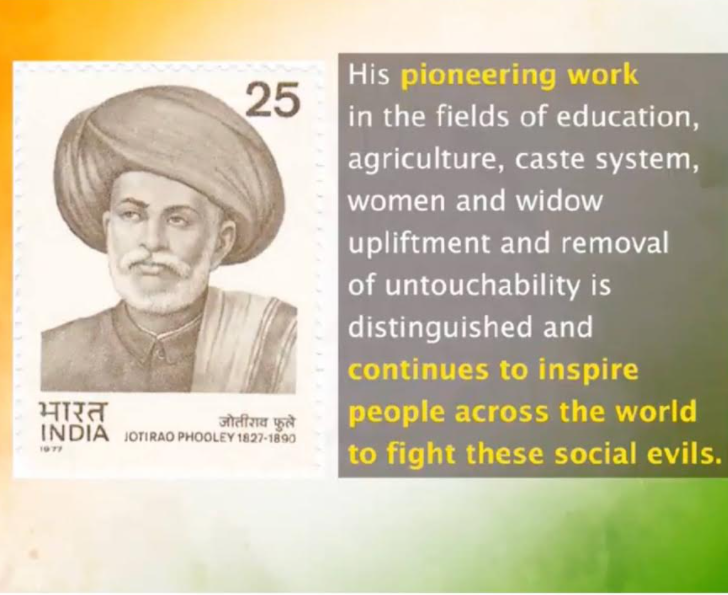Indian History
Jyotirao Phule
- 12 Apr 2021
- 4 min read
Why in News
The 'Tika Utsav (vaccination festival)', started on the birth anniversary of Mahatma Jyotirao Phule (11th April) will continue till the birth anniversary of Babasaheb Ambedkar on 14th April 2021.
- The aim of the four day festival is to vaccinate as many people as possible for the priority groups and zero wastage of Covid-19 vaccine.
- Jyotirao Phule was an Indian social activist, thinker, anti-caste social reformer and writer from Maharashtra. He is also known as Jyotiba Phule.
Key Points
- Brief Profile:
- Birth: Phule was born on 11th April, 1827 in present-day Maharashtra and belonged to the Mali caste of gardeners and vegetable farmers.
- Education: In 1841, Phule was enrolled at the Scottish Missionary High School (Pune), where he completed education.
- Ideology: His Ideology was based on: Liberty; Egalitarianism; Socialism.
- Phule was influenced by Thomas Paine’s book titled The Rights of Man and believed that the only solution to combat the social evils was the enlightenment of women and members of the lower castes.
- Major Publications: Tritiya Ratna (1855); Powada: Chatrapati Shivajiraje Bhosle Yancha (1869); Gulamgiri (1873), Shetkarayacha Aasud (1881).
- Related Association: Phule along with his followers formed Satyashodhak Samaj in 1873 which meant ‘Seekers of Truth’ in order to attain equal social and economic benefits for the lower castes in Maharashtra.
- Municipal Council Member: He was appointed commissioner to the Poona municipality and served in the position until 1883.
- Title of Mahatma: He was bestowed with the title of Mahatma on 11th May, 1888 by a Maharashtrian social activist Vithalrao Krishnaji Vandekar.
- Social Reformer:
- In 1848, he taught his wife (Savitribai) how to read and write, after which the couple opened the first indigenously run school for girls in Pune where they both taught.
- He was a believer in gender equality and he exemplified his beliefs by involving his wife in all his social reform activities.
- By 1852, the Phules had established three schools but all of them had shut by 1858 due to the shortage of funds after the Revolt of 1857.
- Jyotiba realised the pathetic conditions of widows and established an ashram for young widows and eventually became an advocate of the idea of Widow Remarriage.
- Jyotirao attacked the orthodox Brahmins and other upper castes and termed them as "hypocrites".
- In 1868, Jyotirao constructed a common bathing tank outside his house to exhibit his embracing attitude towards all human beings and wished to dine with everyone, regardless of their caste.
- He started awareness campaigns that ultimately inspired the likes of Dr. B.R. Ambedkar and Mahatma Gandhi, stalwarts who undertook major initiatives against caste discrimination later.
- It is believed by many that it was Phule who first used the term ‘Dalit’ for the depiction of oppressed masses often placed outside the ‘varna system’.
- He worked for abolishment of untouchability and caste system in Maharashtra.
- In 1848, he taught his wife (Savitribai) how to read and write, after which the couple opened the first indigenously run school for girls in Pune where they both taught.
- Death: 28th November, 1890. His memorial is built in Phule Wada, Pune, Maharashtra.







